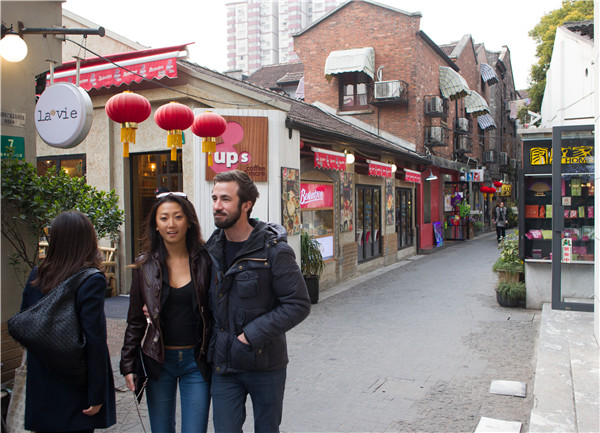Art hub in search of its original mojo
By Yu Ran ( China Daily ) Updated: 2016-05-07 07:39:39
 |
|
Factories and old housing estates used to stand where Tianzifang is now located. [Photo by Gao Erqiang/China Daily] |
Tianzifang may be a bustling tourist hotspot today, but the steady exodus of artists from within has inherently reduced it to a shadow of its former self - a center for arts and culture
The scene along Taikang Road today is a far cry from what it was two decades ago. Now home to the iconic Tianzifang, the area is filled with numerous retail outlets, small snack shops, bars and cafes, most of which are occupied by tourists from other Chinese cities and abroad.
Located in the heart of the city and well known for its labyrinth of alleys, Tianzifang was built where abandoned factories from the 1940s and historical Shikumen residential buildings from the 1920s once stood.
Yu Hai, a professor of sociology at Fudan University who has studied Tianzifang since its inception nearly 20 years ago, says it is a shame that the true charm of the area has been lost in the modernization process.
This used to be a place where people can savor the essence of old Shanghai, and one that was slated to become a community for people from the creative industries. Today, it is just another tourist attraction, albeit a very famous one, that only has a faint glimpse of its artistic core.
"Tianzifang has over the years faced a struggle to gather artists, designers and creative businessmen. Those who are in the area now are also planning to move out," says Yu, who recently led a team of students from Fudan University and Tongji University to conduct an in-depth survey on the current situation of Tianzifang, which is quickly losing its artistic soul to commercialization.
"This should be a place for people to trace back the old times in Shanghai, not filled with shops and restaurants," he adds.
Zheng Rongfa, the former administrative head of the Dapuqiao area which Taikang Road is under, recalls how Tianzifang used to be a vibrant place filled with the sounds and smells coming from the homes of Shanghainese families.
"There used to be an outdoor wet market where housewives would haggle over the price of live chickens in the morning. Many men would smoke cigarettes and play poker on tables in the courtyard in the afternoon," says Zheng, who is widely regarded as "the father of Tianzifang".
|
|
|
|
|
|
|
|

























 Raymond Zhou:
Raymond Zhou: Pauline D Loh:
Pauline D Loh: Hot Pot
Hot Pot Eco China
Eco China China Dream
China Dream China Face
China Face






